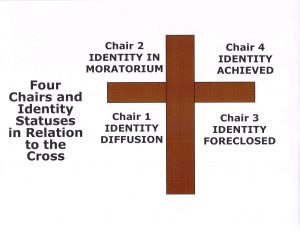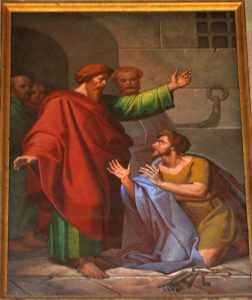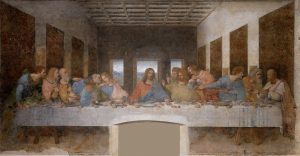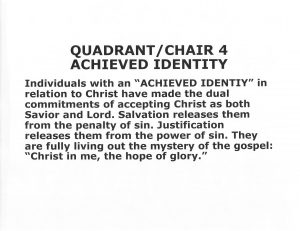
In my previous post, after starting in a diffused state of identity, I left you in Chair 2 in a state of Moratorium. To continue my message, I return to Chair 1. The second path open to individuals in this chair is to slide across the floor to Chair 3 to a foreclosed state. This takes us back to our opening scriptures. Acts 16:25-34, and the story of the Philippian jailor and his question, “What must I do to be saved?”

Paul and Silas’s response was simple and straightforward, “Believe on the Lord Jesus Christ, and thou shalt be saved…” When many have faced this question and answer, their immediate response is: “Is that all there is to salvation?” The answer is “Yes and No.”
There is nothing we can do to earn our salvation. As Paul wrote in Ephesians 2, addressing the saints in Ephesus and the faithful everywhere:
“But God, who is rich in mercy, for His great love with which He loved us, Even when we were dead in sins, hath quickened us together with Christ, (by grace you have been saved:), and raised us up together, And made us sit together in the heavenly places in Christ Jesus: That in the ages to come He might show the exceeding riches of His grace in His kindness toward us in Christ Jesus. For by grace are ye saved through faith; and that not of yourselves: it is the gift of God: Not of works, lest anyone should boast.” (Ephesians 2:4-9, KJV)

Our salvation is a gift from God. We do not work for it. We cannot earn it. However, after we are saved, God does have certain expectations. In II Timothy 3, Paul exhorts his protege Timothy to live according to the scriptures that he learned as a child. God’s word provides us the path of righteousness we are to follow.
“But continue thou in the things which thou hast learned and hast been assured of, knowing of whom thou hast learned them; And that from a child thou hast known the holy scriptures, which are able to make thee wise unto salvation through faith which is in Christ Jesus. All scripture is given by inspiritation of God, and is profitable for doctrine, for reproof, for correction, for instruction in righteousness: That the man of God may be perfect, thoroughly furnished unto all good works.” (II Timothy 3:14-17, KJV)
James amplifies this in his epistle when he states:
“Wherefore lay apart all fifthiness and superfluity of naughtiness, and receive with meekness the engrafted word, which is able to save your souls. But be ye doers of the word, and not hearers only, deceiving your own selves.” (James 1:21-22, KJV)

The word of God provides the power of God to save us from the penalty of sin. Once it is engrafted into our very being, it is the power to save us from the power of sin over us.
Grafting is the act of splicing something from the outside into a host, and after a time, it becomes a part of the host. If we remain in God’s word long enough, it becomes a part of us.
Unfortunately, many people sitting in the pews of our churches are sitting in Chair 3, in a state of Foreclosure. They say they believe. Many even believe that they believe. However, that is as far as they have gone. They have not examined what it means to be a child of the King and joint-heir with Christ. They have borrowed their faith from someone else. Their faith is not their own. It is the faith of their parents, their preacher, or the person who led them to the Lord.

As noted in Slide 12, Foreclosure is the state of acceptance, but not ownership. The powerful Word of God has not been grafted into their lives. The word “grafting” comes from an image of plant husbandry where you join a living branch into a living trunk, and the two become one. Jesus, the living Word of God, has saved them from the penalty of sin. However, He has not yet become the fullness of their life. They have not yet been saved from the power of sin.
In theological terms, being saved from the penalty of sin is referred to as “justification.” Justification is an act of God in which those who put their faith in Christ are declared righteous in God’s eyes and are set free from guilt and punishment for sin. As Paul writes in his epistle to the church in Rome,
“Therefore, being justified by faith, we have peace with God through our Lord Jesus Christ.” (Romans 5:1, JKV)
These are the people that the author of Hebrews strongly chastises. In Hebrews 5, he suggests that there were people who had been in the church long enough to have become teachers, but they were themselves in need of a rehearsal of the first principles of the gospel.
“Of whom we have many things to say, and hard to be uttered, seeing ye are dull of hearing. For when for the time ye ought to be teachers, ye have need that one teach you again the first principles of the oracles of God; and are become such as have need of milk, and not of strong meat. For everyone that uses milk is unskillful in the word of righteousness: for he is a babe. But strong meat belongs to them that are of full age, even those who by reason of use have their senses exercised to discern both good and evil.” (Hebrews 5:11-14, JKV)

Have you ever seen a teenager sucking on a baby’s bottle or drinking from a sippy cup? I would hope not. However, what do you think when you see a five- or six-year-old child with a baby’s bottle? In those circumstances, have you ever said to yourself, “When is that child ever going to grow up?”
It is the same when Christians sit in church pews for years upon years, drinking Gospel milk. Have they ever been asked, “When are you going to grow up and start eating the meat of God’s word”?
Jude, in the opening verses of the Epistle that bears his name, condemns false teachers but also severely reprimands the church people to whom he was writing:
“Beloved, although I was very eager to write to you about our common salvation, I found it necessary to write appealing to you to contend for the faith that was once for all delivered to the saints. For certain people have crept in unnoticed who long ago were designated for this condemnation, ungodly people, who pervert the grace of our God into sensuality and deny our only Master and Lord, Jesus Christ.” (Jude 3-4, KJV)

I am extremely confident that in our modern language, Paul, Jude, and the author of Hebrews are really saying: “Hey folks, wake up! It’s time to grow up!”
In Paul’s first letter to the Corinthian church, he minces no words for these Christians:
“And I, brethren, could not speak unto you as unto spiritual, but as unto carnal, even as unto babes in Christ. I have fed you with milk, and not with meat: for hitherto ye were not able to bear it, neither yet now are ye able. For ye are yet carnal: for whereas there is among you envying, and strife, and divisions, are ye not carnal, and walk as men? For while one saith, I am of Paul; and another, I am of Apollos; are ye not carnal?” (I Corinthians 3:1-4, KJV)
Notice that since one says “I am of Paul” and another says “I am of Apollos,” these carnal Christians had really borrowed their faith from the individual that led them to Christ. They had foreclosed their identity in Christ and borrowed it from someone else. How do we achieve our own identity in Christ?

In John 13 through 17, after the Last Supper in the upper room, Jesus gives His disciples some last-minute lessons before He and His disciples would go out to the Garden of Gethsemane where Judas would betray Him. At several points in those last lessons, Jesus specified how we should identify with Him. He begins by telling His disciples:
“A new commandment I give unto you, That ye love one another; as I have loved you, that ye also love one another. By this shall all men know that ye are my disciples, if ye have love one to another.” (John 13:34-35, KJV)
During the ensuing lesson, Christ repeats the same thought at least seven more times. If something is repeated seven times, it is probably important and something to which we should pay special attention.
How should we love God and each other? In his letter to the church in Galatia, Paul gives us the answer. “For, brethren, ye have been called unto liberty; only use not liberty for an occasion to the flesh, but by love serve one another. For all the law is fulfilled in one word, even in this: Thous shalt love thy neighbour as thyself. But if ye bite and devour one another, take heed that ye not be consumed one of another. This I say then, Walk in the Spirit, and ye shall not fulfill the lust of the flesh. For the flesh lusteth against the Spirit, and the Spirit against the flesh: and these are contrary the one to the other: so that ye cannot do the things that ye would. But if ye be led of the Spirit, ye are not under the law. Now the works of the flesh are manifest, which are these, Adultery, fornication, uncleanness, lasciviousness, Idolatry, witchcraft, hatred, variance, wrath, strife, editions, heresies, Envyings, murders, drunkenness, revellings, and such like: of which I tell you before, as I have also told you in time past, that they which do such things shall not inherit the kingdom of God. But the fruit of the Spirit is love, joy, peace, longsuffering, gentleness, goodness, faith, Meekness, temperance: against such there is no law. And they that are Christ’s have crucified the flesh with the affections and lusts. If we live in the Spirit, let us also walk in the Spirit. Let us not be desirous of vain glory, provoking one another, envying one another.” (Galatians 5:13-26, KJV)

There is a big problem with this passage. It almost sounds like a list of Dos and Don’ts. How do we avoid falling into the tar pit trap that caught the Pharisees?
In the Pharisees’ case, they were trying to keep the commandments on their own, out of their own power. But we know that is futile. David makes that clear in the Psalms:
“The fool hath said in his heart, there is no God. They are corrupt, they have done abominable works, there is none that doeth good. The Lord looked down from heaven upon the children of men, to see if there were any that did understand, and seek God. They are all gone aside, they are all together become filthy: there is none that doeth good, no, not one.” (Psalms 14:1-3, KJV)
How can we love one another and keep Christ’s commandments? It is a great mystery, but Paul summarizes it with three words in Colossians 1:27: “Christ in you.” And then characterizes it with four more words: “the hope of glory.”
Paul speaks of the indwelling of Christ in believers more than 200 times. John mentions it more than 25 times. In no other ideology or philosophy does the founder of the religion live within its followers.

The goal of a Christian is to achieve his or her identity in Christ. He or she should desire to fully live out the “mystery of Christ in me, the hope of glory.” This is described in Slide 13.
I close this lesson with a four-part challenge summarized in Slide 14:
-
What chair are you sitting in?
-
Is God pleased with the chair in which you are sitting?
-
Are you happy with that chair?
-
Would you like to change chairs?

If you are in Chair 2, are you ready by the grace of God to accept Christ’s claim not only as your Savior but also as your Lord? You can slide over into Chair 4 and have Him living inside you, helping you to keep His commandments, especially the one about loving each other.
If you are in Chair 3 and are ready to accept Christ as your Lord, you can climb into Chair 4 and have Him not only reign over you but live inside of you. This is the only way to keep His commandments and show your love toward and devotion to God.

If you are sitting in Chair 1, are you ready to move through Chairs 2 or 3 to reach Chair 4? Are you ready to make the dual commitment of accepting Christ as your Savior and Lord?
If you are sitting in Chair 4, then Praise God! If not, in which chair are you sitting? Would you like to move to Chair 4? If you would, right now is the best time to start moving in that direction.
Leave a Reply